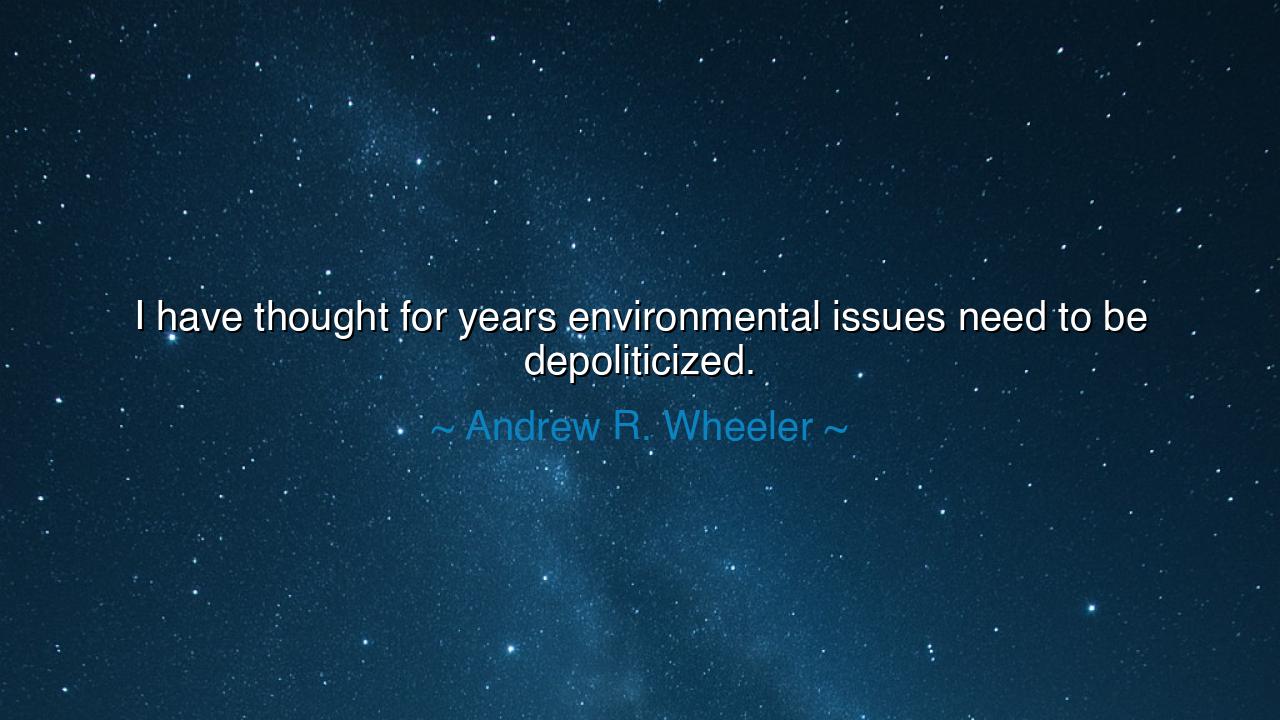
I have thought for years environmental issues need to be






Hear the words of Andrew R. Wheeler, who once led the Environmental Protection Agency, declaring with clarity: “I have thought for years environmental issues need to be depoliticized.” These words are not born of ambition or ornament, but of frustration and longing. For he speaks of a truth that weighs heavily upon our age: the earth itself groans, yet the cries of its suffering are often drowned out by the quarrels of factions and the games of power. To politicize the environment is to turn the health of rivers, skies, and forests into a weapon for partisan victory, when in truth it is the shared inheritance of all humankind.
When Wheeler calls for depoliticization, he points to a higher vision—that the protection of air, water, and land should not be subject to the fickle winds of party loyalty or ideological rivalry. The earth does not belong to one party or another. The river does not flow red or blue, nor does the air carry the banners of factions. The environment is the dwelling place of all, the sacred trust of the present, and the bequest to generations unborn. To divide it along political lines is to betray its universality, to fracture what should unite.
Consider the tragedy of the Cuyahoga River Fire in Ohio in 1969. For decades, the river was used as a dumping ground for industrial waste, until it grew so polluted that it caught fire. The spectacle shocked the nation and spurred bipartisan action, leading to the creation of the Environmental Protection Agency and the passage of the Clean Water Act. In that moment, the people did not argue whether the river was a Republican river or a Democratic river. They simply knew it was their river, and that it must be restored. This unity reveals the truth Wheeler longs for: environmental issues are strongest when lifted above politics.
The deeper meaning of his words is that division weakens resolve. When air quality becomes a political talking point, when forests are defended or exploited based on electoral maps, when climate is debated not for truth but for advantage, the people suffer. Meanwhile, the earth’s wounds deepen, indifferent to the debates of men. Nature responds only to action—trees cut or planted, rivers polluted or cleansed, fuels burned or spared. The environment cannot be swayed by speeches; it can only be healed by deeds.
This teaching is both humbling and heroic. Humbling, because it reminds us that the earth does not wait upon our arguments. Heroic, because it calls us to rise above our divisions, to labor not as partisans but as stewards. True greatness lies not in scoring victories for party or ideology, but in safeguarding the fragile systems that sustain life itself. Wheeler’s plea is thus a call for courage—to set aside rivalry and to unite in the cause of creation’s preservation.
Children of tomorrow, take this wisdom into your hearts: when you speak of the environment, speak not as partisans but as guardians. In your communities, resist the temptation to divide the earth’s care into camps of left and right. Instead, labor together to plant trees, to conserve water, to protect the soil and skies. Support leaders who treat the environment not as a weapon of politics, but as a sacred trust. Let your deeds show that unity in preservation is greater than division in debate.
Thus the wisdom of Wheeler’s words endures: that environmental issues must be depoliticized if they are to be solved. The air we breathe, the waters we drink, the lands we cultivate—these belong to all, and they demand action free from rivalry. Let this teaching guide you, that the earth may be preserved not for one party or people, but for all humanity, and for generations yet unborn. For in the care of the earth lies the truest form of justice, and in unity lies the only hope of survival.






AAdministratorAdministrator
Welcome, honored guests. Please leave a comment, we will respond soon